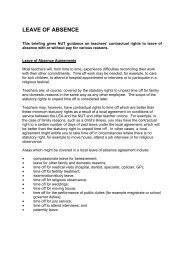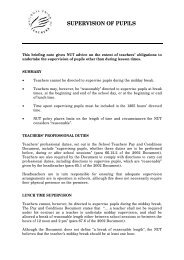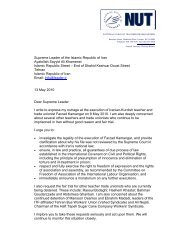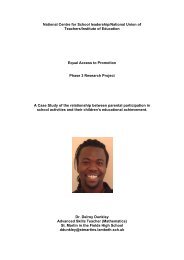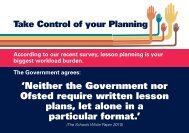Reducing Teachers' Workload â A Way Forward - National Union of ...
Reducing Teachers' Workload â A Way Forward - National Union of ...
Reducing Teachers' Workload â A Way Forward - National Union of ...
Create successful ePaper yourself
Turn your PDF publications into a flip-book with our unique Google optimized e-Paper software.
In particular, teachers in the latter group (largely primary school teachers) believed that going<br />
<strong>of</strong>f site either to do school work or for personal reasons was considered to invite suspicion <strong>of</strong><br />
“skiving”.<br />
After lengthier discussion teachers appeared to warm to the concept – as a theory. In<br />
particular, they articulated the argument that if they were required to put in the tremendously<br />
long hours that appear currently to be expected <strong>of</strong> them during evenings and weekends it was<br />
not unreasonable for them to be allowed <strong>of</strong>f-site during any non-contact time they might<br />
have. Indeed, secondary teachers in particular acknowledged that on the rare occasions when<br />
they had to go <strong>of</strong>f-site for personal reasons during the school day, and had time to do so,<br />
there was never a problem. However most teachers believed that it would be a long time<br />
before reductions in workload made this a frequent occurrence.<br />
Interestingly, one school (already referred to) thought that the right to be <strong>of</strong>fsite when duties<br />
permit would force the end <strong>of</strong> the after-school sessions on Monday and Wednesday referred<br />
to, which would indeed be a real benefit to them. One <strong>of</strong> the few remaining benefits <strong>of</strong><br />
school teaching is that it can allow teachers to fit their working hours, long as they are,<br />
around family commitments. Going promptly at 3:45 p.m., and putting in the hours later<br />
when children are in bed, has real advantages as a work pattern for some teachers.<br />
In general, therefore, teachers welcomed the Implementation Report recommendation on<br />
being allowed <strong>of</strong>f-site – if they could ever have the time to take advantage <strong>of</strong> it.<br />
Administrative support<br />
Our discussions about administrative support were some <strong>of</strong> the most interesting <strong>of</strong> the<br />
project.<br />
In general, teachers seem to be ambivalent about administrative support. Whilst no one likes<br />
administration, teachers are very poor at suggesting what or who could take the burden <strong>of</strong>f<br />
them. They are not particularly good at analysing the jobs they do in conceptual terms – why<br />
should they be, given the time pressure on them ? – and therefore do not tend to distinguish<br />
between what is in place in their school and what might be.<br />
To take one example, where there is a policy on collecting money teachers are happy to let<br />
others do it. The system works well, and teachers are happy with it. However where<br />
collecting money is still a teacher’s responsibility teachers cannot easily see how this could<br />
be otherwise. This may be because they know there is no resource to implement it. It<br />
follows that teachers themselves – and arguably their headteachers – are not always going to<br />
be best placed to come up with suggestions for passing bureaucratic responsibilities onto<br />
administrative staff.<br />
NUT/ATL 15 <strong>Reducing</strong> Teacher’s <strong>Workload</strong>




